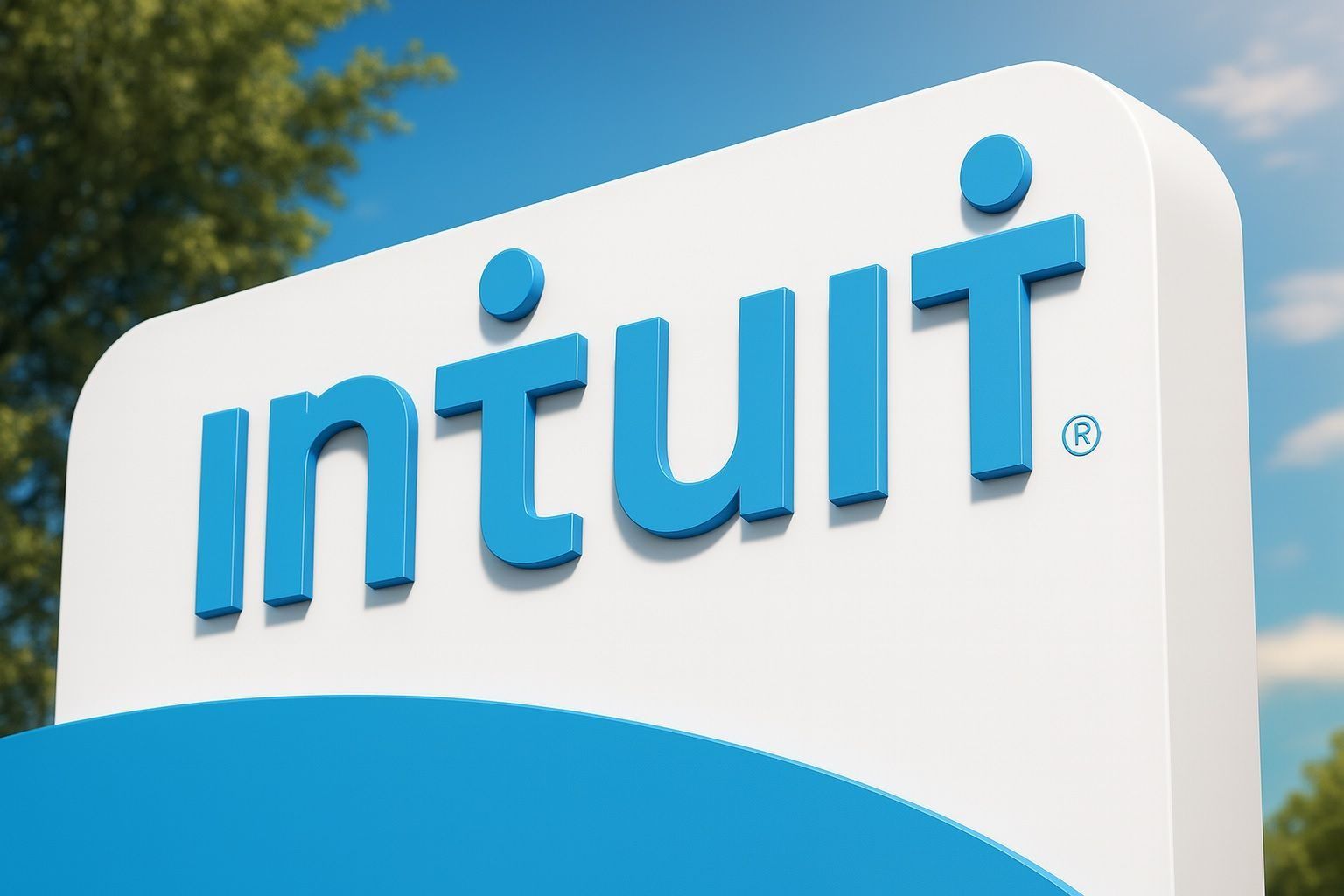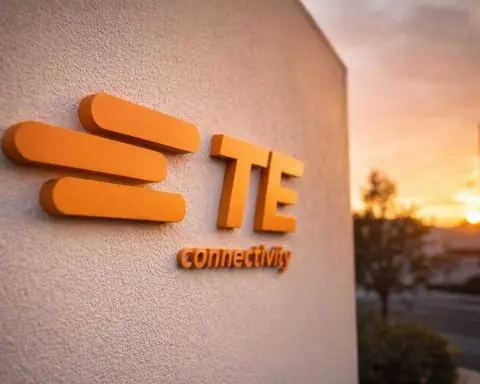Intuit Inc. (NASDAQ: INTU) is back in the AI spotlight today after unveiling a multi‑year partnership with OpenAI that will see flagship products like TurboTax, QuickBooks, Credit Karma and Mailchimp embedded directly inside ChatGPT. The company has also signed a contract worth more than $100 million to deepen its use of OpenAI’s models across its own AI platform, GenOS. 1
The market likes what it sees. As of this afternoon, Intuit shares are trading around $652.98, up roughly 1% on the day, after earlier spiking as investors digested the news and fresh bullish commentary from Wall Street. 2
Key takeaways
- Intuit and OpenAI have signed a $100M+ multi‑year deal to integrate OpenAI’s frontier models into Intuit’s platform and power AI agents across its products. 1
- TurboTax, QuickBooks, Credit Karma and Mailchimp will be available as “Intuit‑powered apps” inside ChatGPT, letting consumers and small businesses take real financial actions without leaving the chat interface. 1
- Evercore ISI reiterated its Outperform rating and $875 price target, arguing the deal both removes competitive fears around OpenAI and massively expands Intuit’s distribution via ChatGPT’s ~700 million monthly active users. 2
- Large investors are still buying: Nomura Asset Management just increased its Intuit stake by 6.2%, while consensus on Wall Street remains a “Moderate Buy” with an average price target around $792. 3
- Intuit reports Q1 2026 earnings on November 20, giving investors just two days for this AI megadeal to be reflected — or challenged — by hard numbers. 4
What Intuit and OpenAI announced today
This morning, Intuit published a detailed press release announcing a multi‑year strategic partnership with OpenAI designed to “revolutionize financial intelligence” by combining Intuit’s AI‑driven expert platform with OpenAI’s frontier models. 1
At a high level, the deal has two pillars:
- Apps in ChatGPT
- Intuit will launch dedicated apps for TurboTax, QuickBooks, Credit Karma and Mailchimp inside ChatGPT.
- With a user’s permission, these apps will tap into their financial data and Intuit’s domain expertise to answer questions and, crucially, take actions on the user’s behalf. 1
- $100M+ model access and AI agents
- Intuit has signed a $100M+ multi‑year contract to deepen its use of OpenAI’s models within its proprietary generative AI operating system, GenOS. 1
- Those models will help power AI agents that can understand complex financial questions, surface insights instantly, and execute tasks like forecasting cash flow, preparing taxes, or managing payroll via natural conversation. 1
Intuit says it already serves approximately 100 million customers worldwide across its product family and expects the partnership to both deepen engagement with existing users and extend its reach to new audiences discovered directly through ChatGPT. 1
OpenAI, meanwhile, gains a powerful, data‑rich partner whose software is deeply embedded in small business and consumer financial workflows — a prime proving ground for real‑money AI use cases.
What this means for users: TurboTax and QuickBooks inside ChatGPT
One reason this deal is getting so much attention is that it’s not just another chatbot integration. The Intuit apps are designed to perform high‑stakes financial tasks, not just answer generic questions.
According to Intuit’s announcement and follow‑up coverage, here’s what’s coming. 1
For consumers
Within ChatGPT, a user will be able to:
- Estimate tax refunds by letting the TurboTax app reason over their financial data.
- Get personalized answers to tax questions, grounded in their actual numbers rather than generic rules.
- Compare credit cards, personal loans and mortgages based on spending patterns, credit profile and approval odds via Credit Karma.
- Schedule time with a live AI‑enhanced tax expert when they want a human in the loop. 1
In other words, instead of asking “What’s the best way to pay off my debt?” and getting a generic answer, users could allow the Intuit app to inspect their finances and return tailored recommendations they can act on instantly from within ChatGPT.
For small and mid‑sized businesses
For QuickBooks and Mailchimp users, Intuit is promising:
- Real‑time cash‑flow insights and revenue‑boosting suggestions based on live accounting data.
- Automated invoice reminders generated and sent from QuickBooks to help businesses get paid faster.
- Targeted marketing campaigns via Mailchimp, drafted by AI and aimed at segments the system identifies as most promising.
- Context‑aware financing options, surfacing business loans that match the company’s profile, while accounting runs quietly in the background. 1
All of these actions would be executed from inside ChatGPT, using Intuit’s infrastructure under the hood — effectively turning the chatbot into a smart console for an entire financial stack.
Street reaction: AI threat becomes AI partner
Today’s announcement also changes the narrative that had been building around Intuit and AI over the past few quarters.
Some investors were unnerved when Intuit’s guidance for its Global Business Solutions segment — home to QuickBooks and Mailchimp — came in softer than expected, and when more advanced large language models from OpenAI were seen as a potential competitive threat to application software providers. 5
Now that threat looks much more like a distribution and product‑innovation opportunity:
- Evercore ISI reaffirmed its Outperform rating and $875 price target, highlighting two key benefits:
- The partnership reduces fears that OpenAI would eventually bypass platforms like Intuit.
- It dramatically expands Intuit’s reach by exposing its tools to OpenAI’s estimated 700 million monthly active users on ChatGPT. 2
- The firm also pointed out that Intuit already enjoys revenue growth above 15% and gross profit margins over 80%, leaving room for AI‑driven pricing power and operating leverage if the apps see strong adoption. 2
Meanwhile, Nomura Asset Management disclosed that it raised its stake in Intuit by 6.2% in the second quarter, acquiring 6,138 additional shares and bringing its holdings to 105,863 shares valued at about $83.4 million at quarter‑end. 3
Across Wall Street more broadly, data compiled by MarketBeat shows:
- A “Moderate Buy” consensus rating.
- An average price target of about $791.82 per share. 3
Independent valuation work from Simply Wall St estimates Intuit’s intrinsic value around $760 per share based on a discounted cash‑flow model, implying the stock trades at a modest discount to that fair value despite a headline PE ratio near 48x. 6
How today’s news fits Intuit’s broader AI strategy
The OpenAI partnership is not a one‑off stunt — it sits on top of a decade of AI and data investment that Intuit has been leaning into more visibly over the last year:
- The company has built GenOS, a proprietary generative AI operating system that orchestrates multiple models (OpenAI and others) and powers AI agents across its platform. 1
- Earlier this year, Intuit introduced an “all‑in‑one” platform with a virtual team of AI agents for businesses in Canada and the UK, aimed at boosting efficiency and growth. 7
- On November 17, it announced a partnership with advisory firm Rehmann to deliver an AI‑native ERP solution and services to mid‑market businesses, further extending its push into more complex, multi‑entity clients. 7
Fund managers such as Baron and RiverPark, despite short‑term concerns about guidance and software valuations, have repeatedly described Intuit as a “high‑quality software compounder” with durable recurring revenue, strong pricing power and long‑term upside from its evolution into a connected financial platform. 5
Today’s deal effectively locks in a premium seat at the AI table for Intuit, anchoring that broader strategy to one of the industry’s most influential model providers.
The near‑term catalyst: Q1 2026 earnings on November 20
Investors won’t have to wait long to see whether the AI optimism is matched by fundamentals.
According to MarketBeat and Intuit’s own investor calendar: 4
- Q1 2026 earnings report date:
- November 20, 2025, after the market close.
- Consensus expectations:
- Earnings per share (EPS): about $3.10.
- Revenue: roughly $3.76 billion.
- Company guidance:
- Q1 EPS guidance between $3.05 and $3.12.
- Full‑year FY 2026 EPS guidance between $22.98 and $23.18.
In its most recent reported quarter (Q4 2025), Intuit:
- Delivered EPS of $2.75, beating the consensus estimate of $2.66.
- Generated $3.83 billion in revenue, up about 20% year‑over‑year. 4
Analysts will be watching Thursday’s call closely for:
- Early signs of how quickly customers are adopting Intuit’s AI agents.
- Any quantification of the expected revenue or margin impact from the OpenAI partnership.
- Updated commentary on growth in key businesses like Mailchimp, where softer guidance previously weighed on sentiment. 5
Valuation, risks and what to watch
Even with today’s pull‑back from recent highs, Intuit is not a cheap stock on traditional metrics:
- The shares trade at roughly 48x earnings, versus an estimated mid‑30s multiple for the broader software sector, according to MarketBeat and Simply Wall St data. 3
- On the other hand, long‑term valuation work suggests the stock may be around fairly valued to modestly undervalued relative to discounted cash‑flow estimates and AI‑driven growth expectations. 6
Key risks investors and observers should keep in view:
- Execution risk on AI features
The promise of fully integrated financial apps in ChatGPT is huge, but Intuit must prove that real consumers and businesses will trust and use these tools at scale — especially when they impact taxes, debt and business cash flow. - Regulation and data privacy
High‑stakes AI in finance will attract regulatory attention. Intuit stresses its commitment to privacy, security and responsible AI governance, but regulators globally are still writing the rules on how data can be used in such systems. 1 - Dependence on OpenAI
A $100M+ contract is a big, long‑term commitment. If OpenAI’s pricing, model roadmap or competitive position shifts, Intuit may have less flexibility than AI‑agnostic rivals. - Macro and software multiple pressure
As several hedge‑fund letters have noted, Intuit’s shares have been hit during broader rotations out of high‑multiple software names, especially when guidance doesn’t fully clear a high bar. 5
For now, though, the OpenAI tie‑up gives Intuit a compelling story: instead of being disrupted by large language models, it is aiming to monetize them directly through its existing high‑margin, recurring‑revenue businesses.
Bottom line
On November 18, 2025, Intuit firmly planted its flag as one of the most aggressive AI adopters in mainstream finance software:
- It locked in a $100M+ multi‑year deal with OpenAI.
- It secured prime real estate for TurboTax, QuickBooks, Credit Karma and Mailchimp inside ChatGPT.
- It reassured Wall Street enough to earn reaffirmed Outperform ratings and fresh institutional buying — just days before a closely watched earnings report. 8
Whether you’re a customer, competitor or investor, Intuit’s message today is clear: financial workflows are moving further into conversational AI, and the company intends to be at the center of that shift.
This article is for informational purposes only and does not constitute financial or investment advice. Always do your own research or consult a qualified professional before making investment decisions.






